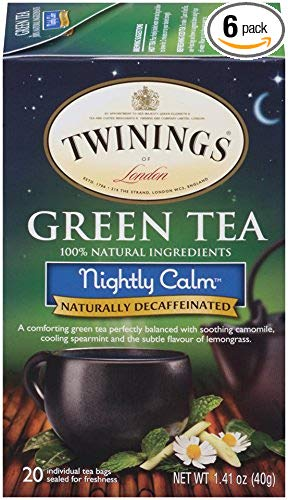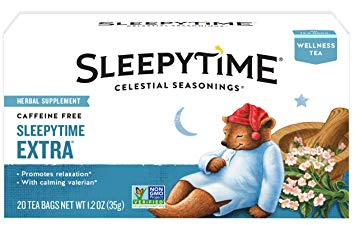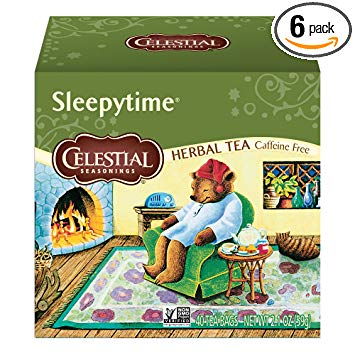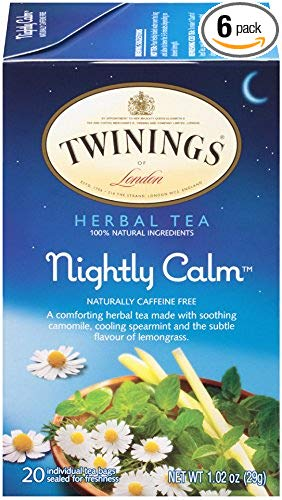Size: 6-pack of 20 tea bags
Price: $20 – $25
Ingredients: Green tea, chamomile, spearmint, lemongrass, linden
Tea is the most popular beverage worldwide after water. In the United States alone, 80 percent of people drink tea, and 50 percent do so on a daily basis.
Americans love their tea. It offers similar boosts in alertness to coffee, but with less caffeine, so it interferes less with sleep and can be enjoyed later in the day than the typical 2pm cutting off point for coffee drinkers.
But can tea actually help you sleep? Do so-called “bedtime” and “sleepytime” teas really work? Keep reading to find out – or jump straight to our reviews.

amazon.com
Shop NowSize: 6-pack of 20 tea bags
Price: $20 – $25
Ingredients: Green tea, chamomile, spearmint, lemongrass, linden

amazon.com
Shop Now
Size: 3-pack of 20 tea bags
Price: $15 – $16
Ingredients: Chamomile, tilia, valerian, spearmint, lemongrass

amazon.com
Shop NowSize: 6-pack of 40 tea bags
Price: $21 – $22
Ingredients: Chamomile, spearmint, lemongrass, tilia flowers

amazon.com
Shop Now
Size: 6-pack of 20 tea bags
Price: $16 – $20
Ingredients: Chamomile, spearmint

amazon.com
Shop NowSize: 6-pack of 20 tea bags
Price: $20 – $25
Ingredients: Chamomile, spearmint, lemongrass, linden

amazon.com
Shop NowSize: 6-pack of 16 tea bags
Price: $22 – $29
Ingredients: Chamomile, lavender, lemon balm

amazon.com
Shop NowSize: 6-pack of 16 tea bags
Price: $19 – $25
Ingredients: Passionflower, valerian, chamomile, spearmint, lavender
Drinking tea before bed soothes many people. There is a calming aspect to sipping a warm liquid in your favorite mug before nodding off. It may mimic the effect of taking a warm bath before bed. Even though the bath or tea water is hot, it ends up cooling you down. As your body dries off and the extra water evaporates from your skin, the corresponding drop in body temperature signals to your brain that it’s time for sleep.
Of course, caffeinated teas, such as black tea, white tea, and caffeinated green tea, should be avoided late at night, but there is some evidence that drinking certain herbal teas before bed can help facilitate sleep.
Sleepytime and bedtime teas are caffeine-free, herbal teas made of many of the same materials that are found in sleep supplements, including valerian root. It’s not the tea, but rather the ingredients, that help you sleep. Although, tea is often a much more pleasant way of ingesting these ingredients, and can be a calming activity in and of itself. For instance, ingredients like valerian root are quite stinky when taken alone, and taking a supplement with a quick swig of water is not nearly as relaxing an experience as drinking a full cup of warm tea.
By combining multiple pro-sleep, anti-anxiety herbal ingredients, bedtime teas create an overall calming bedtime experience that promotes sleepiness at the same time. Some sleepytime tea ingredients have a sedative effect, like chamomile or valerian, while others, like lavender and lemon balm, reduce the stress and anxiety that plague insomniacs. Still others, like catnip in the mint family, alleviate indigestion so the body can relax for sleep.
While many of these teas have a mild effect, if any at all, the placebo effect of knowing it’s a sleepytime tea may be enough to get you to fall asleep. As with most things, your reaction to the tea will depend on your personal sleep issues and taste preferences, and even what else you ate or did that day.
Below we review the best tea ingredients for sleep. You’ll find many bedtime teas actually contain multiple of these ingredients.
 Chamomile is oft cited as the best tea for sleep. The perennially popular herbal tea has been used for centuries to stave off insomnia, stress, anxiety, and upset stomachs. Chamomile has positive effects on individuals with mild to moderate generalized anxiety disorder, and it also has antidepressant qualities. The tea works as a mild tranquilizer, relaxing the nerves and muscles.
Chamomile is oft cited as the best tea for sleep. The perennially popular herbal tea has been used for centuries to stave off insomnia, stress, anxiety, and upset stomachs. Chamomile has positive effects on individuals with mild to moderate generalized anxiety disorder, and it also has antidepressant qualities. The tea works as a mild tranquilizer, relaxing the nerves and muscles.
Multiple small studies have found chamomile to provide various benefits, although the results are still inconclusive regarding sleep. One 2011 study split individuals with insomnia into two groups: one group took a placebo while the other took a chamomile extract twice a day for four weeks. While the chamomile had no effect on sleep onset, quality, or overall length, it did show some improvement in daytime functioning. However, a 2005 study of rats found chamomile extract helped them fall asleep much quicker.
Why do we believe chamomile helps induce sleep, despite not having any conclusive evidence? Like many of the teas on this list, chamomile has a calming effect that promotes relaxation. And we believe it helps us sleep – that may be the most important part of all.
Chamomile can induce an allergic reaction, and should be avoided by pregnant women or anyone about to have surgery due to its blood-thinning properties. For best results, steep this sweet and flowery tea for 10 minutes before drinking.
 While chamomile is the most popular tea for sleep, there’s a stronger option preferred by those who really need help falling asleep: valerian tea.
While chamomile is the most popular tea for sleep, there’s a stronger option preferred by those who really need help falling asleep: valerian tea.
Unlike chamomile, studies have proven moderate improvement of insomnia symptoms in drinkers of valerian tea.
As a strong natural sedative, valerian root has been used since the second century to help people fall asleep faster, reduce symptoms of insomnia and anxiety, and increase overall sleep quality. It works so well, that some people use it instead of melatonin supplements. Plus, valerian tea helps sleep without causing many of the side effects associated with other common sleep medications.
However, valerian root can become addictive or interfere with other medications, so check with your doctor before taking it. Valerian also takes a few days to a few weeks for the effect to kick in. For best results, steep for at least 5 minutes before drinking.
 Green tea is always a healthy option, and serves as a nice bedtime tea alternative for those who don’t like the taste of herbal teas.
Green tea is always a healthy option, and serves as a nice bedtime tea alternative for those who don’t like the taste of herbal teas.
The decaf version includes theanine, which reduces stress and improves sleep. A sponsored study of young men in their 20s found that those who took a pure L-theanine supplement before bed enjoyed better sleep efficiency, and a more energized mental state upon waking. However, a cup of tea doesn’t really have sufficient amounts of theanine to get you to fall asleep, so individuals really having trouble sleeping might want to get a pure L-theanine supplement instead.
Other benefits to green tea include potential weight loss, increased cognitive performance, deeper sleep, better digestion, and reduced cancer and diabetes risk.
 Lavender reduces stress and anxiety, which comprise many of the thoughts that keep insomniacs up at night. It may be the smell of lavender that promotes sleep, rather than ingesting it: a 2005 study found that smelling lavender oil before bed increased the time spent in deep sleep, and resulted in corresponding feelings of restoration and higher energy levels the following morning.
Lavender reduces stress and anxiety, which comprise many of the thoughts that keep insomniacs up at night. It may be the smell of lavender that promotes sleep, rather than ingesting it: a 2005 study found that smelling lavender oil before bed increased the time spent in deep sleep, and resulted in corresponding feelings of restoration and higher energy levels the following morning.
Lavender tea may have stronger effects for women. In one study of new postnatal mothers, the participants who drank one cup of lavender tea for two weeks had lower rates of depression and fatigue, an effect which went away when they stopped having the tea.
 As far back as the Middle Ages, insomniacs have been relying on this calming herb to reduce stress, anxiety, and indigestion. As a member of the mint family, lemon balm has a minty yet lemony taste. There are lemon balm teas available, or you can steep lemon balm leaves in a cup of hot water.
As far back as the Middle Ages, insomniacs have been relying on this calming herb to reduce stress, anxiety, and indigestion. As a member of the mint family, lemon balm has a minty yet lemony taste. There are lemon balm teas available, or you can steep lemon balm leaves in a cup of hot water.
For best results reducing insomnia, lemon balm should be combined with other herbs. In one study, 81 percent of participants with mild sleep issues slept better with a combo of lemon balm and valerian than those who took a placebo. Lemon balm may interact with the GABA receptors in your brain, the activation of which reduces stress and helps induce sleep.
 Passionflower tea is beloved by people with anxious and obsessive thoughts. The floral tea calms the mind as well as the stomach, since it also alleviates indigestion.
Passionflower tea is beloved by people with anxious and obsessive thoughts. The floral tea calms the mind as well as the stomach, since it also alleviates indigestion.
Passionflower relaxes the nervous system, and a 2011 study found that it at least improves sleep quality in the short-term.
The herbs above are the most popular bedtime tea flavors. Many sleepytime teas also include one or more of the following ingredients to promote sleep:
All images from Wikipedia.